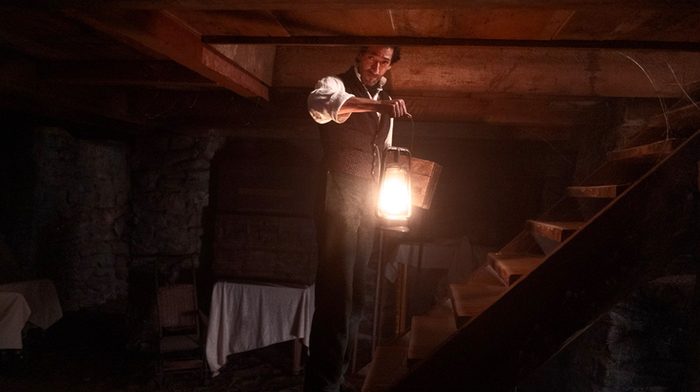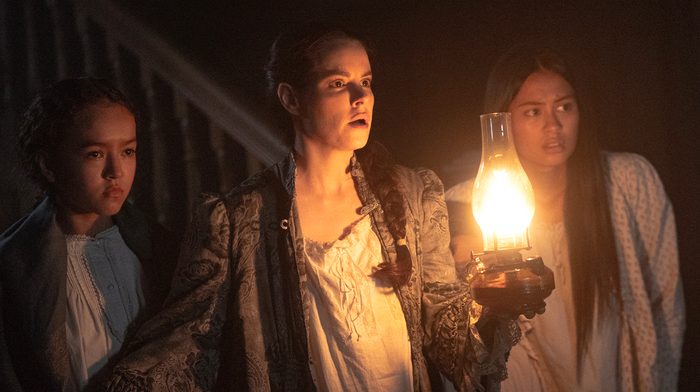While the films from the Stephen King adaptation renaissance we’re currently in have been (mostly) good, the same can’t be said for the TV shows. Castle Rock, inspired by King’s work in general, turned out to be a disappointment. The recent streaming takes on The Stand and Lisey’s Story were both miscalculations. Can Chapelwaite, the latest show that gets to bill itself as being based on something King wrote, succeed where its recent predecessors have failed? Not quite, but that doesn’t mean you shouldn’t pay Chapelwaite a visit.
While The Stand and Lisey’s Story were more direct adaptations of King’s work (King himself even wrote the scripts for Lisey’s Story), Chapelwaite is more of an “inspired by” situation. The 10-episode series, which premieres on Epix August 22, 2021, counts King’s short story “Jerusalem’s Lot” as its source material, but anyone who has actually read the story – like me! – can tell you this is a very loose take on that tale. But that’s not a decision worth penalizing Chapelwaite for – we can only accept what we’ve been given, and what we’ve been given is a story that’s been needlessly stretched out. King’s story, a Lovecraft by way of Poe pastiche presented as a series of letters, was a secluded affair. It was set primarily in a big spooky house and primarily focused on two characters.
Chapelwaite has expanded things considerably, and not exactly for the better. One gets the sense that creators and writers Jason Filardi and Peter Filardi wanted to turn this into something of an ensemble piece, delving into new supporting characters. But these characters are never very interesting, or well-drawn. They feel like contrivances rather than regular human beings, and whenever the story cuts away to them, Chapelwaite sags.
At the center of it all is Charles Boone (Adrien Brody) a moody sea captain who has spent the last few years living on his ship with his wife and his children (Jennifer Ens, Sirena Gulamgaus, and Ian Ho), all of whom have spent their entire lives so far at sea. When his wife dies, Boone and his family descend into melancholy, and there’s a great moment early on where the Boone children sob uncontrollably as their mother’s body is buried at sea – it’s brutal, emotional stuff, and it suggests a much better show.
The Boones soon have a change of scenery: they move from the ship to the small village of Preacher’s Corners, Maine, where resides Chapelwaite, the Boone family’s ancestral home. It was once the residence of Charles’ now-dead cousin Stephen, and while Charles wasn’t overly familiar with the man, he quickly learns that the folks in Preacher’s Corners are not fans – of Charles or the Boones in general. As far as Charles’ new neighbors are concerned, the Boones are all evil and/or crazy. It doesn’t help that Charles’ kids are of mixed race (their mother was Polynesian, from the Marquesas Islands of the South Pacific), something that cranks up the xenophobia and racism in town.
All the dirty looks and antagonism from the villagers are bad enough, but to make matters worse, the Boone family’s new house is a rather spooky place. Charles insists he hears rats scratching away inside the walls, even though an exterminator swears up and down that there are no rats. A dark incident from Charles’ childhood plagues him, and he lives in fear of going mad – a fear that’s been exacerbated by the move. Soon, Charles is having weird visions of worms. Lots and lots of worms. Seriously, folks – get ready to see lots of shots of worms. Brody even rips a comically long worm out of his nose at one point. Honestly, they could’ve gotten away with calling this Stephen King’s Wormtown.
While seemingly every single person in Preacher’s Corners immediately hates the Boones, they do find acceptance in Rebecca Morgan (Emily Hampshire), who takes a job as the family’s governess. But Rebecca has ulterior motives – she’s a writer and plans to write something about Chapelwaite for the Atlantic. But the more time she spends with the family, the more she grows to like them and reconsider her mercenary approach.
Brody is fine as the morose lead, but Hampshire – who was so wonderful on Schitt’s Creek – is miscast here. Her Rebecca feels far too modern, and nearly everything she does, and every line she delivers, always feels like it’s from the mind of a modern-day screenwriter, not an actual person living in the world of the show.
There are good ideas buried in all of this, and the show has a gorgeous, gothic vibe that will appeal to fans of the genre. While often considerably underlit (even for a show set in a dark house in the 1800s), the haunted, haunting atmosphere is the real star of the show. Real dread starts to set in – at least at first. But Chapelwaite is a deliberately paced show, which is a nice way of saying it’s slow as molasses. There’s nothing wrong with slow-paced narratives, but Chapelwaite truly begins to drag after its first few episodes, and it’s clear that had the show cut down its episode numbers to something shorter (let’s say six instead of ten), things would turn out for the better.
Folks familiar with King’s work will no doubt realize that the source material’s title – “Jerusalem’s Lot” – is connected to King’s vampire novel Salem’s Lot. Sure enough, the story was a prequel to the novel, which means Chapelwaite is a Salem’s Lot prequel, too. With that in mind, you know it’s only a matter of time before the series busts out the bloodsuckers. But gosh, does it have to take so damn long to get there?
The post ‘Chapelwaite’ Review: This Stephen King Adaptation Has Great Gothic Atmosphere, But the Story is Stretched Too Thin appeared first on /Film.


0 Comments